
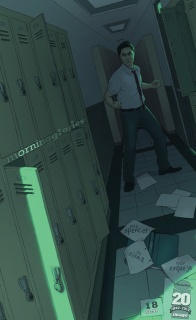
In today’s edition of Study Hall, Crit and I tackle the 18th issue, our Jun centered issue, as some insight into his past is given, a sneaky twist is offered and things are set up for what we can only assume will be an explosive finale.
So join Crit and I after the cut as we discuss the issue, its story and possible hidden secrets that we may or may not be picking up on. We should also note: this discussion contains massive spoilers for the issue. Colossal. Ginormous, even. The issue is out today, so make sure to read it first before you read our thoughts. It helps to give the issue a few read throughs before coming to us, but consider this your warning about impending spoilers.
As always, our very lovely/supremely awesome column header was designed by the graphic designer for the actual book, Tim Daniel! For more of Tim’s work, please visit his site Hidden Robot and be on the lookout for Tim’s upcoming comic debut, Enormous! Many thanks to Tim for being fantastically awesome and providing it to us.
Matthew Meylikhov: Hey everyone, and welcome back to the latest MGA Study Hall! It’s our first one post-site relaunch, and that means we’re doing the column in an all new fashion — by changing nothing at all. What a twist, right Crit?
Crit Obara: I can’t believe it myself!
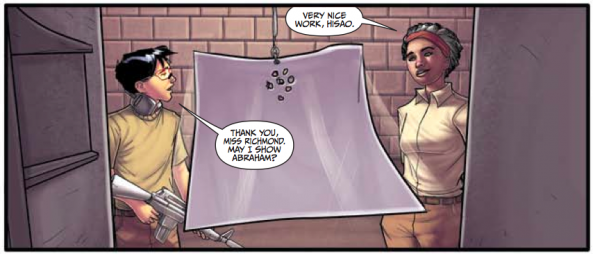
MM: So lets begin, four years ago in a secret child army training facility. We begin by seeing Jun (as we know him, his real name being Hisao thanks to some unhelpful trickery back in the last arc), and Jun is in class with new character Miss Richmond firing assault rifles. I believe you and I have speculated that Abraham has an army of some kind before, and while we never said it was a child army this pretty much confirms that.
CO: Yes, I think we believed that was possible because he couldn’t be doing all his work alone.
MM: And his army is made up of all children, assumedly, with a few adults mixed in for training purposes, which weirds me out a little bit because all I can think of is child armies in Uganda, which is sad.
CO: The idea of him having them lined up here to train them in marksmanship is pretty extreme. But it makes sense.
MM: I don’t know about you, and I could be overthinking this here, but did you perhaps have any mental connection between this child soldier training facility and Morning Glory Academy? Besides the obvious ones, I mean.
CO: Hm…could it be the anti-MGA?
MM: That’s what I was thinking. Like, MOST highschools have “rival” schools. We’ve talked about Abraham being against MGA before, and it only makes sense that he would create his own “school” of sorts. I mean, MGA is clearly training their kids for something. Now we have Abraham’s facility more literally training kids, this time with firearms.
CO: Sure, I think that makes lots of sense. I’d say this scene confirms the idea of him building an army and maybe he knew from the “start” (this was 4 years ago it says) that he’d be needing an army in the war against MGA.
MM: Of course, this brings up the idea (in me, at least) that maybe MGA isn’t necessarily the villain here, but that’s probably a conversation for another time.
CO: Hmm…interesting. Yeah, that’s something to explore another time, but interesting nonetheless.I also think it’s possible that neither side is “good” and both are just fighting for something they want or believe in that isn’t necessarily a good thing for anyone but them.
MM: Always a possibility, sure. Before moving on, we should also mention that Miss Richmond here is visually modeled after Agent 355 and Beatrice Klugh from LOST, which makes me assume this probably won’t be the last time we see her.
CO: Ms. “Clue!” I remember her.

MM: So this issue introduces us to Guillaume, and since this is an article that thrives on discussing spoilers I don’t think there’s anything wrong with saying that this is Jun’s young/first love. When you started reading this issue, did you think it would end up in that direction?
Continued belowCO: Nope, I didn’t. I didn’t get that at all from that first scene and then later, bam. Honestly, I thought it was pretty cool. Very unexpected. What did you think?
MM: Nope, no idea. I thought something was going to happen with them based on how Guillaume behaves through the whole thing, but I didn’t think they’d fall in love. Did you think he would show up at the school? Because that I did admittedly think would happen.
CO: Yeah, unlike the other part, that didn’t surprise me, because after that opening scene I figured it would be connected to what was going on at the school. Him being there seemed to fit.
MM: Speaking of the school, we are transported back to the school as the kids deal with the environment suddenly being entrenched in darkness, and some of the kids seem to be taking it pretty hard, including Jun’s twin brother (and, according to Joe, the girls from Nerd Girls Eye View making a cameo in the background). They are all freaking out, really. There is a line dealing with this scene later on in the issue, but when you first read it did that seem odd to you at all? Don’t you think most people would be excited to be free of the school?
CO: I think it’s strange that they’re reacting like this just because it’s night. There’s never really any discussion on what those particular kids know, since the school is still there but just different. What did you think about the different schools?
MM: My guess was time displacement based on the scene in issue #14 with Danny McBride. The school, when we see it later, looks like it is in ruins, so I would assume they’re in the future. If we’re assuming some kind of war is coming to school, they would assumedly be at a place when that fight is done — assumedly because someone is taking them out of harms way?
CO: Okay, I can see that. Then I don’t think it’s that strange that they’d be freaking out. Maybe to us they should be happy to be away from the school, but really they just feel like they’re completely lost without it. Creepy.

MM: I think this harkens back to our “we should have this conversation someday but not right now” thought that the school isn’t the “bad guy”. Despite all the horrible things they’re doing from a moral and ethical standpoint, they are still a school and maybe there is some validity to that?
CO: Sure, it’s possible. They could be trying to save the world, for a better tomorrow and all that. Then again, they could also be trying to destroy it.
MM: Here’s a line I really like in the same vein as this discussion: Jun’s brother Hisao (the real Jun) says, “You escaped me once, traitor.” He calls him a traitor, but Jun has never done anything to specifically betray his brother, has he? Not by a traditional thought process, anyway. What is he betraying? He just happens to be in line with “the other team” (with that being a reference to his allegiance with Abraham and not anything else).
CO: I don’t know. Perhaps something to do with their switch when they were younger, and how Jun/Hisao didn’t come back for Hisao/Jun immediately?
MM: I can see that. I like that in the same scene of the two of them fighting, it matches up with young Jun vs young Guillaume.
CO: That page is fantastic. 2 frames of each fight. Then the next page too, which breaks it into smaller frames that kind of show the franticness of the fights.
MM: It also re-enforces the whole “this has happened before, this will happen again” thing we’ve discussed happening in the book.
CO: Definitely, and I feel like every example of that is probably very important. More important than we even know.
MM: I liked that it showed off how even though we’ve seen Jun training and in the gym and being a bad ass, he still kinda sorta gets his ass handed to him — and it was also a nice way to segue into Guillaume appearing in the present of book.
CO: I wrote down that Guillaume winning the fight might be showing us that this army is strong and might have the upper hand in the upcoming war.
Continued belowMM: It’s possible, sure. They clearly have heavy weapons training, and they’re also hidden in the background of the school, so any student we see could technically be part of Abraham’s Army, or AA (not to be confused with the other AA).
CO: Haha, yes. Now how about that interesting conversation Abraham is having that Hisao overhears part of?
MM: Yeah, and Miss Daramount sitting in the room with him?

CO: That sure looks like her, yes. Her instructions say it “has to be these six” of his children. I was curious about that line.
MM: I was wondering if she’s talking about OUR six, but later in the issue I think it becomes clear that it is a different six. I’m happy with it being a different six, though, based on what that implies about our current main characters — especially since, as we know, Morning Glories #1 opened up with Brendan, a character who I thought would be the main character of the book until he ended up dead. (And, truth be told, I’m sure that is not the last we’ve seen of him. 100% positive.)
CO: I want to lean that way too. It seems too easy to think of our 6 as the 6 they’re talking about.
MM: It COULD be our six, sure, since our six were assembled over time with seemingly no great connection other than their birthdays and Abraham’s appearance in their lives. But I’d like to believe there is a second group of kids out there. That implies that whatever our six are doing, Abraham (or Daramount or whoever) has tried to pull off this scheme before, and that’s an exciting thought. However, the real question is — if Abraham is running the anti-MGA, why is Daramount there?
CO: Yeah, that doesn’t add up at all. “You know we have a higher calling here” she tells him. That makes it sounds like they are either working together or, and this is crazy and might make no sense but it came to me, working for the same person on opposite sites of a battle. I had this image of someone high above both of them pulling the strings on each side.
MM: Someone making them fight each other for that person’s own amusement?
CO: Yeah, something right along those lines.
MM: That’s an interesting thought. It is also a confusing thought, because then, like, where does Miss Hodge fit into it all? Because we thought Hodge was working with Abraham too.
CO: It’s not a fully realized idea in my head, but that line had me thinking that and it was wacky enough that I liked it. And I’m not sure where or how Hodge would fit in to that. Hm.
MM: To segue into the next scene a bit, Jun talks with Abraham and shows him the target he shot up. Abraham has a really sneaky line in there: “Never confuse an opponent with an enemy.” He also describes the person in his office as “a friend.” So I suppose it is possible that MGA and anti-MGA are against each other, but not enemies. Like what you were saying earlier: they have a goal they both want to win, but they aren’t enemies.
CO: When he says “friend” I took that more as “I don’t want to explain who this person is” than an actual friend. It’s much easier to say “just meeting with a friend” and drop it instead of explaining anything. There’s nothing more to explain if he just says “friend,” and that works.
MM: Kind of like when people say “How are you?” you’re supposed to just say “Good”, even if you aren’t?
CO: Right. Same thing. An answer is given, that part of the conversation is over, then you can move on.

MM: Sure, I can buy that. Then again, Abraham does drop the “For a better future” line in this issue. The full line is actually, “We’re in this together, and we all need each other. All together, one and all — for a better future.” Granted, he’s talking about Jun’s relationship with Guillaume here, but that does seem like a transferrable line with Daramount in his office.
CO: Yeah, I can see that applying there.
MM: You know, before we move on, a thought occurs based on your idea here.
Continued belowCO: Ok!
MM: In line with what you were saying about how the schools are being manipulated… well, what if its all a big game of chess? We have two schools working for a better future, and we need someone to be standing tall at the end to help usher in a better future. So both sides are pitted against each other towards the middle. Daramount has her teaching ways, Abraham has his, and they pit their students together Battle Royale-style to see who wins. There are elements of this that assuredly don’t match up with what we’ve seen happen (for example, why would Abraham be chained in the basement if this is all a game between friends), but if, say, “the Headmaster” is manipulating everyone for that one central goal, it is plausible that both schools aren’t enemies. They’re just opponents.
CO: I can see it. Definitely. And maybe even my idea of there being a game orchestrator / Headmaster above them exists too. And maybe it keeps happening over and over, as we’ve speculated. Someone from the team leads the team the next go around of the battle.
MM: It’s Jacob and the Man in Black playing Senet with the survivors of Oceanic 815 and the Others.
CO: Indeed.
MM: Moving back to the future, Guillaume reveals that he didn’t come after Jun when he arrived because he has his orders, and so does Jun. When he says that, he points to Jun’s unconscious brother. We learn a page later that Jun is here to save “him”, and while you and I had guessed a while ago about Jun being here to save Hisao/Jun we are given a shot of the end of issue #2 when Jun was breaking into what we had originally thought was an armory, with “him” now assumedly meaning Abraham.
CO: Ah, yes. And Guilliame makes a comment that there are “gifts” they possess and he’ll see them “once your eyes are opened.” Familiar line.

MM: Right. Guillaume also makes reference to the children of the school being brainwashed, which is as plausible a reason as any as to why they might be so upset about the current predicament.
CO: I would agree with that.
MM: There’s a nice speech here during the “four years ago” segment from Abraham that confuses more than it explains things. Abraham doesn’t seem to want to send the kids in for their mission, but he does so because he has to. It once again draws question to the conversation with Daramount from his office earlier.
CO: I don’t know military ranks, but he’s like the general of his troops being told by the guy above him to send in the troops. He’s on the battlefield with them getting word from someone far away saying “move in.”
MM: Sure, that works. Though it is weird to think of Abraham under Daramount’s thumb.
CO: I agree. He has always seemed like a guy doing things on his own, not taking orders from anywhere.
MM: And now he looks to be as much a pawn as anyone else.
CO: And that has really messed with my head.
MM: It wouldn’t be a proper issue of Morning Glories if something wasn’t “answered” that in turn makes another element that much more confusing.
CO: Of course!
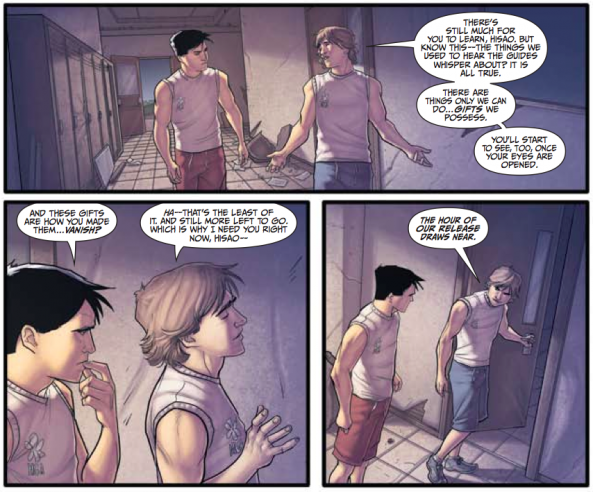
MM: So now we move into the scene you were referencing where they enter the destroyed school and Guillaume reveals he used his “gift” to transport them through time (we assume). He also mentions “the hour of our release draws near.” Any additional insight into this line now that we’ve encountered it with more knowledge?
CO: I don’t think so, no. I noted that he says making things disappear is “the least of it” meaning his powers. Kind of ominous…made me wonder just how powerful are these kids?
MM: And who has powers and why? Or does everyone have powers, and it is just a sea of untapped potential?
CO: Good questions.
MM: I’ve begun thinking about “release” in a bigger, more existential context personally. Like, release more on par with words with a heavy religious connotation like salvation than just the dictionary definition of being released from something.
CO: I never thought of it like that before, but wow. I like that more than release as in leaving school. It’s so much bigger and more exciting.
Continued belowMM: Abraham sort of touches on it in his speech a little bit, and obviously there are religious associations with Abraham as a character. He mentions “this is the only way to save all that is worth saving,” so I would imagine that the hour of our release drawing near is perhaps more global and universal of a release.
CO: It really raises the stakes because saving the world and being “released” in that way is much more important than saving the school and getting out.
MM: Right, and that brings back Casey being “most likely to save the world” from way back. And to bring religion in more heavily, when the kids are leaving in the bus in the next scene, Abraham says “say a prayer for your brother and sisters.” So the hour of release has me thinking, like… I dunno. Maybe the opposite of the rapture? Or a friendlier version of the rapture? Or just some sort of global enlightenment/awakening type deal.
CO: “Friendly version of the rapture” is a great phrase and I’m going to start a band as soon as this is over and that’s our album name.
MM: Hahaha, go for it.
CO: But yes, I like that idea of global awakening.
MM: Also, I am really curious as to where that bus is going. They’re being loaded into a school bus but I would assume they’re not being brought to the school.
CO: Maybe they’re being put back into the wild as sleeper agents until Daramount can manipulate the school into accepting them.
MM: Sure, and this would clear up how Jun got into the school despite being the “wrong” brother. So do you have any insightful comments about the love scene?
CO: I don’t believe so! You?
MM: Me neither. The “For a Better Future” poster is in the background, though.
CO: Indeed it is.
MM: I guess I do want to make note that I like that this happens in general just to help show the diversity of Morning Glories as a comic compared to other things on the stands. Like, obviously you not being a big reader may not have noticed this, but even though Jun isn’t openly gay with the rest of the group (which, in and of itself, is a rather diverse cast), this scene is a nice way of Morning Glories going that one extra step further to show that it is unafraid to reflect a bigger world with a wider audience.
CO: Yeah, I don’t have the context of reading lots of comics, but as I said before I didn’t expect it and thought it was pretty cool.
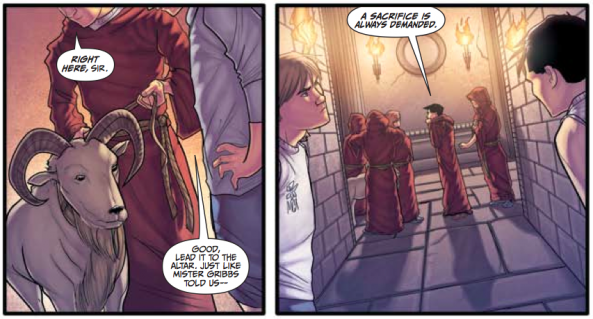
MM: Moving on, we see Jun’s brother leading a group of his guards to the basement we had seen before in issue #2, preparing a sacrifice to end this time-travel wonkiness.
CO: And they have a goat for that purpose. “Lead it to the alter just like Mr. Gribbs told us.”
MM: A ram!
CO: Ram! Sorry to all the rams and goats out there who may be offended by my mistake.
MM: Right after that, we have a scene of Abraham talking to Jun about why Guillaume had to leave and the importance of their mission. A line is repeated in both: “A sacrifice is always demanded.” Curious that.
CO: What do you think it means?
MM: Well, really just that Abraham is more involved with the school and perhaps its origin than just being a guy trying to destroy it. There’s a lot of talk in the Abraham sequence about “destiny” and “fate”. He seems to believe that what is happening has to happen, whether he has a say in it or not. Given that he got a list of students that he had to send to the school, I’m wondering if his version of “fate” is someone else telling him what fate is.
CO: I think “fate” just might be, as you’re saying, told by someone. Which really doesn’t it make it fate at all, but it is to the kids as long as they’re told it is, I guess.
MM: Well, the kid’s version of “fate” is what they’re told fate is. Abraham’s is passed down to him. The real question is, like we’ve said before, who is deciding what fate is? Who is at the top of that ladder? The Headmaster? God? A talking cat with lazer eyes, the ability to speak English and an affinity for cheese burgers?
Continued belowCO: I can definitively say that I wish it was the cat.
MM: Oh, wait, I wasn’t supposed to say that out loud. That was a secret special uber-spoiler I know because I know the ending of the book.
CO: I’ll pretend I didn’t read that then. At this point I’m on board with it being the Headmaster who might be controlling this whole thing. Both sides.
MM: I will add that Jun has a line in this scene to the tune of “sometimes it all just feels like a game.” Given Spencer’s penchant for tricky dialogue, that could be a bigger reveal than anyone realizes.
CO: Good catch there.
MM: Abraham also mentions that “the world needs our help.”
CO: I really wouldn’t be surprised if it’s some crazy game at this point, almost Battle Royale-esque as you mentioned. A game with real-world and global implications beyond the school.
MM: There’s also something about “the promise that was made to us.” This is a brand new line, I believe, and it is bolded in the lettering so you can be sure this is a bit to pay attention to. Do you have any idea what Abraham is talking about here? What promise could this be? I mean, I have a guess, but I think it’s an “I’m overthinking this” guess, so I want to hear your thoughts first.
CO: I’m not really sure. If I had to make a guess I’d guess there was some kind of reward promised for an individual fulfilling their role in all of this, but what it is, I’m not sure. Eternal life? Something to do with the afterlife? I’m just guessing wild here.
MM: I’m going to toss some of my religious upbringing your way.
CO: Toss it!
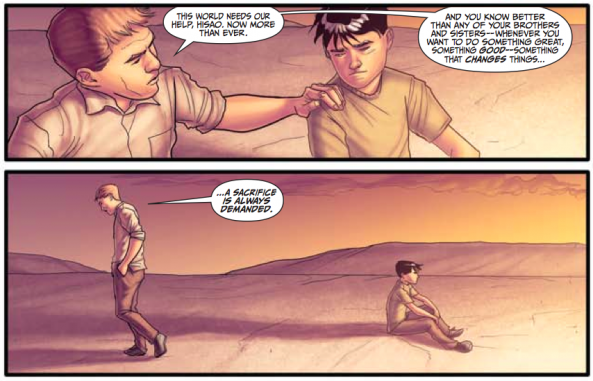
MM: For Jews, Christians and Muslims, Abraham is an important biblical figure, and through him there is an established covenant with God; this covenant, in essence, being a promise from God. We’ve mentioned Abraham being the Jewish iteration of the biblical figure and have had confirmation of such in the pages of the book at his “funeral” (and from talking to Nick Spencer), so if we’re going off of that, the covenant with God would be for not just A Holy Land, but THE Holy Land — or, specifically, the “Promised” land. I would imagine, given the religious subtext here, that this could be what he is referencing.
CO: Very interesting.
MM: We also know that there is a real war at some point during the Morning Glories storyline/timeline. It’s possible that this is a land war. Or rather, a war for territory.
CO: He actually mentions the “majesty” of the land they’re sitting on.
MM: See? Land is important!
CO: That could be the territory or land that they’re fighting over. Yes. It’s also possible that wherever MGA is, whatever land it is on, is the promised land here.
MM: And that would be why Daramount shows up to talk with Abraham, because both of them are trying to take it over from the Headmaster?
CO: Turf war! Maybe the reason the kids don’t know where the school is (since they’re being drugged on their way in to the school and we still don’t technically know where it’s located) is because the land is so important they just straight up aren’t allowed to know where it’s located.
MM: Honestly, I’m also kind of getting the impression that Abraham feels he is the rightful owner of MGA. Like, perhaps whoever the current Headmaster is usurped Abraham of ownership of the school in some past event, and that could explain why he and Daramount assumedly team up and play war games with children? The school is “the Promised Land” of this metaphor, and Abraham is taking it for his own, whether it is his “biblical right to” or not.
CO: I like that. I can agree with that.

MM: So, the ending. This feels like a bit of a tease, almost specifically at us: “Always acting so smart, and still you can’t figure this one out?” Outside of Spencer egging you and I on specifically, what do you think we’re suppose to have figured out here?
CO: I didn’t end this one figuring anything big out, I don’t think. You?
MM: Well, I think the more obvious answer would be that the reveal is Zoe is an agent of Abraham. But we kinda sorta already knew that. It was certainly implied and believed. I think the less obvious answer here is that Zoe “Regular” isn’t the agent, but rather the “Other” Zoe you and I have discussed in the past; the one that comes out when Zoe “goes to sleep” or whatever. I need a better name to call that, but I think you and readers of this column know what I’m referring to.
Continued belowCO: Yes, her other side.
MM: I guess there is High School Teen Girl Zoe, and then there is Predator Zoe. But that also feels like the answer I’m supposed to know already, so I want to believe there is something here I’m missing.
CO: If there’s something else, I’m not sure what it is either.
MM: I mean, it seems to imply that everyone was sent here with a mission. If there really is a second entity within Zoe, what we can call the Predator, then I would guess that Zoe herself may be brainwashed by Abraham to carry out certain missions of her own.
CO: And that’s her role, and probably each other Glory has a certain purpose or role. But hers is the deadliest.
MM: So they all have missions they need to do, even if they don’t necessarily know them. Maybe they need to get the Predator to go after the guys who are going to sacrifice the ram, because Jun and Guillaume aren’t killers?
CO: Sure. And may the missions are their “fate,” but that word should probably be in quotes because it seems likely to have been dictated to them, therefore it’s not natural like true fate.
MM: Right.
CO: I think that’s my big theory coming out of this issue.
MM: That fate isn’t real?
CO: No, that their fate may not be true, real fate, but instead a fate that has been given to them.
MM: Is there anything in your notes we haven’t covered up to this point?
CO: No sir! How about you?
MM: We’ve got everything I had notes of. One thing I did want to note is that I’m curious if the flashback storytelling is going to be a staple from here on out. I like getting to look into people’s pasts and seeing how it illuminates the present, but I wonder if the next arc might go back to straight-forward present day storytelling like the first arc did. I kind of miss that a little bit.
CO: Not sure!
MM: So, today we learned that Morning Glory Academy is really one part of a two part equation full of subterfuge so that Abraham can get back the biblical Promised Land (which is actually the academy) from the Headmaster in a deadly game of Chess-Meets-Battle-Royale. Am I summing that up correctly?
CO: That’s a succinct and accurate wrap up of our discussion, yes.
MM: Well, until next time then!
CO: Crit out!

Previous Issues: #1, #2, #3, #4, #5, #6, #7, #8, #9, #10, #11, #12, #13, #14, #15, #16, #17
Previous audio podcasts: second arc interviews, #7, #8, #9, #10, #11, #12, second arc wrap-up






